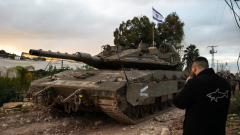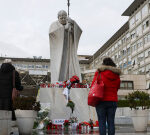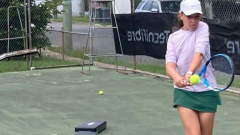Jenin, occupied West Bank – A crowd of people gathered to watch two massive armoured bulldozers rumble into the Jenin refugee camp, tearing apart the asphalt to clear a path for three Israeli tanks.
“This is the first time I’ve seen a tank with my own eyes,” a young man said, his voice a mixture of awe and disbelief, as the sun set over one of the entrances to the camp on Sunday.
Before him, two massive bulldozers rumbled forward, destroying more of the road underneath them. The refugee camp, nearly emptied after weeks of relentless attacks, was bracing for yet another military incursion.
Ahmed, born in Jenin in 2003 at the height of the second Intifada, had witnessed military incursions before. But Israeli tanks had not been seen on the streets of Jenin since 2002, when that uprising began, and it looks like the Israelis are planning to linger.
Ahmed stood among a group of young men and boys on Haifa Street, near one of the camp’s entrances.
“It won’t be easy for them to stay,” he muttered, as the heavy machinery continued its work.
For more than an hour, journalists, locals, and a nearby Israeli military jeep observed in silence as the bulldozers dismantled the roundabout on Haifa Street. Then, as the last pieces of debris were pushed aside, the engines of the Merkava tanks rumbled, and the armoured vehicles began their advance into the city.
A young man standing nearby, when asked whether he expected immediate resistance, shook his head. “I don’t think so. There’s no one left in the camp, not even the fighters.”

The tanks and the stones
Nonetheless, as the tanks pressed forward towards the refugee camp, a familiar scene unfolded.
Groups of Palestinian youth and children, armed with nothing but stones, hurled them at the approaching tanks. In response, the operator of one of the tanks aimed its cannon and turret directly at the crowd of journalists and onlookers. Moments later, the air filled with tear gas, dispersing the young men and children who had gathered.
Israel has been conducting near-daily raids in the occupied West Bank since 2022; its stated aim being the weakening of armed Palestinian resistance groups operating there. Since the war in Gaza began in October 2023, Israel has increased the deadly force it uses in the West Bank, using helicopters, drones and now tanks.
This latest intensification of violence in Jenin began on January 21, but Israeli forces have also attacked elsewhere, including in Qabatiya and Tulkarem. On Sunday, Israeli Defence Minister Israel Katz said that he had instructed the military “to prepare for a long stay in the cleared camps for the coming years, preventing residents from returning and stopping terrorism from regrowing”.
Among those watching the tanks disappear into the camp was one young man who had been displaced just weeks earlier. He stood in silence, his face tense with uncertainty. “Once again, we don’t know what will happen,” he said. “I have a house to stay in for now, but many people have nowhere to sleep tonight.”

Salvaging belongings
According to the United Nations Relief and Works Agency for Palestine Refugees (UNRWA), more than 40,000 Palestinians have been forcibly displaced from their homes in the West Bank, and Israeli forces are refusing to allow them to return.
The blockade to the camp in Jenin follows weeks of siege, during which initially Palestinian Authority forces and then the Israeli military imposed severe restrictions on movement, cutting off water and electricity to the camp.
Many families were forced to flee suddenly, leaving behind their belongings, including a group of women n





